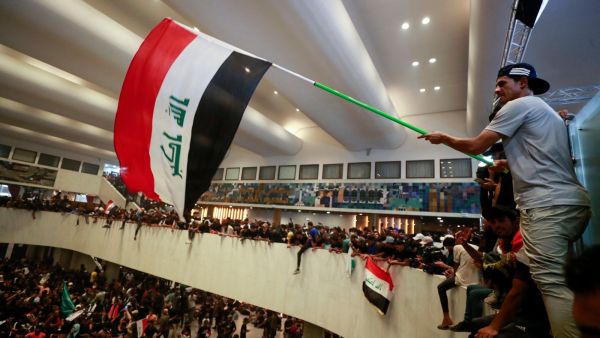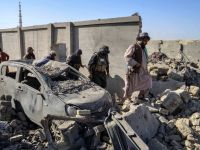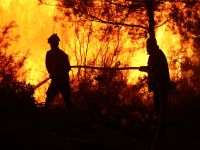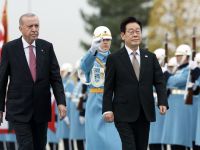Iraqi politicians may finally be saying enough is enough. The country has suffered too many crises in the past year and it’s time to put the breaks on and aim for a new chapter.
It’s two political developments made simultaneously - of choosing a new president Abdul Latif Rashid and appointing a new prime minister Mohammad Shia Al Sudani to form a government, and he has 30 days to do that, may signal the end of political deadlock in Iraq and signals the fact that Iraqis may now want to put their swords into ploughshares.
Iraqi parliament elects Abdul Latif Rashid as new president | Politics News | Al Jazeera https://t.co/6rfLvqKERv
— Howard Dean (@GovHowardDean) October 16, 2022
However, it’s still too early for too much hope, but a brave face is being put on as Iraqi politics is making literally everyone aghast, today and since 2003 when strongman Saddam Hussein was forcibly removed from power. Politicians spent the last 12 months in a state of fratricidal stalemate and everyone is hoping the new developments now may just work. In one full swoop elects both a president who appoints a prime minister and starts picking ministerial posts.
Many argue that this should have been done long ago despite the bickering and the anger in Iraq’s parliament and on the streets. However, politics has a way of working itself out regardless of the so-called ‘street intifada’ and the ransacking of Iraq’s parliament in the last July by Sadrists supporters after their 73 MPs resigned their seats in June having been elected in the 10 October 2021 polls.
The new designated Iraqi Prime Minister Mohammad Shia' Al-Sudani @mohamedshia was appointed to form a new government for the Federal Republic of Iraq. The KRG Representation in Austria congratulates him and wishes the new PM-designate success. pic.twitter.com/IOyLO3ukgY
— KRG Austria (@KRG_Austria) October 14, 2022
Lawmakers on Thursday elected Kurdish politician Abdul Latif Rashid as Iraq's new president, who then named Mohammad Shia al-Sudani as prime minister-designate.https://t.co/8WTDHi4UXD
— WION (@WIONews) October 15, 2022
The resignations of the Sadrists was the first opportunity for the Coordination Framework which is a motley collection of pro-Iranian parties lead by the ‘State of Law’ coalition of 44 seats. Today the CF - as the largest in parliament - has been able to put their man as prime minister and also agree on a president although its a ceremonial post but held by a Kurdish Sunni. He is important because he gets to pick and name the prime minister according to “Iraqi Constitutional convention,” and his choice is based on the largest block in parliament.
But Iraq is not out of the woods yet and political violence is only a stone’s throw away.
During the elections for the president and prime minister a volley of rockets were fired on Baghdad’s ‘Green Zone’ area and a number of these landed in the courtyard of parliament. Nobody claimed direct responsibility but it’s thought these rockets came from Sadrists supporters who are clamoring for yet another general election but this is not in the pipelines at least for another year or longer.
The word is out ‘no can do’ but many are saying both the new prime minister as well as the Coordination Framework would be able to give the Sadrists ministerial seats as part of the horse-trading process that is likely to take place for 30 days and even longer judging from from the wayward state of Iraqi politics and the multitude of political parties that are divided along ethnic, sectarian and religious lines that include Shiites, Sunnis and Kurds and more subdivisions within these groupings.
But this even gets more complicated, especially in parliament through alliance formations as individual Sunnis may support different Shia parties depending on their perspectives, perhaps ideologies and changing self-interests that tend to be parochial. As well, the two main Kurdish parties - the Patriotic Union of Kurdistan and the Kurdistan Democratic Party fluctuate in their support. Each part backs different allies and formations. The new president Al Rashid is supported for instance by the Coordination Framework. This was not the case of Barham Salih the outgoing president who made it clear that he would like to serve another term as president.
So at last the Iraqi political system maybe back on track and the new government up and running, ready to take over from Mostafa Al Khadhimi, the man who acted as caretaker prime minister since last October and during these turbulent times which many seen have been the worst for Iraq in decades. Any new government however would have to deal with Iraq’s ongoing economic crisis with nearly four out of 10 people out of a job according to international statistics. Getting unemployment down would certainly get people off the streets.
But can Iraq's political elite do that? There is hope but there is also plenty of cynicism. Critics argue there is a political class in Iraq but it’s only interested in maintaining on to their power. Therefore not much will be done to alleviate the condition of the people which is a great pity because Iraq has lots of potential because of its oil and extensive reserves of the black gold but it needs to get its house in order first of all.







